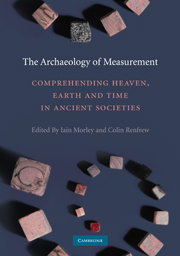Book contents
- Frontmatter
- Contents
- List of figures and tables
- List of contributors
- Acknowledgements
- The Archaeology of Measurement
- Introduction: Measure: Towards the construction of our world
- SECTION I NUMBER: COUNTING, MATHEMATICS AND MEASURE
- SECTION II MATERIALISING THE ECONOMY
- SECTION III DIMENSIONS AND BELIEF
- SECTION IV CALENDAR AND COSMOLOGY
- SECTION V THE SPIRITUALITY OF MEASURE
- Index
- References
SECTION V - THE SPIRITUALITY OF MEASURE
Published online by Cambridge University Press: 05 June 2012
- Frontmatter
- Contents
- List of figures and tables
- List of contributors
- Acknowledgements
- The Archaeology of Measurement
- Introduction: Measure: Towards the construction of our world
- SECTION I NUMBER: COUNTING, MATHEMATICS AND MEASURE
- SECTION II MATERIALISING THE ECONOMY
- SECTION III DIMENSIONS AND BELIEF
- SECTION IV CALENDAR AND COSMOLOGY
- SECTION V THE SPIRITUALITY OF MEASURE
- Index
- References
Summary
The concluding section of the book takes a specific look at theological conceptions of the relationships among the measurable finite, the immeasurable infinite, cosmology and worldview. These chapters represent reactions to the evidence and questions asked of it in the preceding sections and present additional perspectives on the relationships between measurement and our attempts to engage with the material world and elements beyond it.
LeRon Shults, from a background in theology and philosophy, focuses his commentary in particular on human engagement with the ‘beyond’ element of the title of the conference, ‘Measuring the World and Beyond’. With the ability to measure and quantify the world arises an awareness of the immeasurability of certain phenomena. Shults draws out the theme of ‘control’ as being central to many of the chapters within the volume and, in particular, how this often leads to attempts to control the uncontrollable – for example, the uncontrollability of time and the degeneration of our corporeal form and material goods. He says that the questioning of such issues as what lies at the ends of our personal time – birth and death – lies at the roots of spirituality. If spirituality can be considered to be (at least partly) the process of making meaning of the experience of finite temporality, then as archaeologists we can hope to identify attempts to engage in this process.
- Type
- Chapter
- Information
- The Archaeology of MeasurementComprehending Heaven, Earth and Time in Ancient Societies, pp. 245 - 246Publisher: Cambridge University PressPrint publication year: 2010



